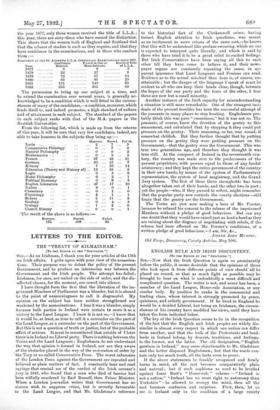LETTERS TO THE EDITOR.
THE "TREATY OF KILMAINHAK" [To THE EDITOR OF THE "SPECTATOR."] 'SIR,—As an Irishman, I thank you for your articles of the 13th -on Irish affairs. I quite agree with your view of the assassina- tions. Their purpose was to defeat the policy of the present Government, and to produce an internecine war between the (Government and the Irish people. The attempt has failed; Irishmen, for once, are united on the side of order, and the die- affected classes, for the moment, are cowed into silence.
I have thought from the first that the liberation of the im-
prisoned Members of Parliament was a blunder, but it is absurd to the point of unmeaningness to call it disgraceful. My opinion on the subject has been neither strengthened nor weakened by the assassinations. I fear it was a blunder, simply (because both parties in Ireland were certain to score it as a victory to the Land League. I know it is not so,—I know that it would be, at least, as true to call it a surrender on the part of the Land League, as a surrender on the part of the Government. But this is not a question of truth or justice, but of the probable effect of actions. It must be remembered that outside of Ulster there is in Ireland no Liberal party. There is nothing between the Tories and the Land Leaguers ; Englishmen do not understand the way that opinion is formed in Ireland, nor are they aware of the obstacles placed in the way of the restoration of order by 'the Tory or so-called Conservative Press. The worst calumnies of the London Press against the Government are repeated and believed as plain matters of fact. I constantly hear and read sayings that remind me of the verdict of the Irish coroner's jury in 1847, who found that a man who died of famine had been wilfully murdered by Earl Russell, then Prime Minister. When a London journalist writes that Government has no sincere wish to suppress crime, but is secretly favourable to the Land League, and that Mr. Gladstone's reference to the historical fact of the Clerkenwell crime, having turned English attention to Irish questions, was meant as an incitement to more crimes of the same sort,—he knows that this will be understood like profane swearing, which no one is expected. to interpret quite literally, and which is said by those who have tried it to be a great relief to excited feelings. But Irish Conservatives have been saying all this to each other till they have come to believe it, and their news- paper organs are constantly repeating the same, in ap- parent ignorance that Land Leaguers and Fenians can read. Evidence as to the actual mischief thus done is, of course, un- attainable ; but the danger of the language I speak of must be evident to all who can keep their heads clear, though, between the hopes of the one party and the fears of the other, I fear these are now but a small minority.
Another instance of the Irish capacity for misunderstanding a situation is still more remarkable. One of the strangest inci- dents of the present troubles has been the successful attempt of the peasants in many places to stop hunting. Englishmen pro- bably think this was pure "cussedness," but it was not so. The peasants, of course, knew the devotion of the gentry to this amusement, and calculated that by stopping it they could put pressure on the gentry. Their reasoning, so far, was sound, if somewhat childish. But they further thought that by putting pressure on the gentry they were putting pressure on the Government,—that the gentry were the Government. This was true two generations ago, and therefore they thought it was true still. At the conquest of Ireland in the seventeenth cen- tury, the country was made over to the predecessors of the present proprietors, with powers equal to those of any feudal aristocracy ; and they kept the entire government of the country in their own hands, by means of the system of Parliamentary representation, the system of local magistracy, and the Grand Jury system. The first of these three strongholds has been altogether taken out of their hands, and the other two in part ; yet the people—who, if they paused to reflect, might remember that the popular party now controls the county elections—still fancy that the gentry are the Government.
The Tories are just now making a hero of Mr. Forster, because he refused his consent to the release of the imprisoned Members without a pledge of good behaviour. But can any one doubt that they would have raised just as loud a howl as they are raising about the disgrace of negotiating with rebels, if the release had been effected on Mr. Forster's conditions, of a written pledge of good behaviour.-1 am, Sir, &c.,
JOSEPH JOHN MURPHY.
Old Forge, DU712112ElTy, County Antrim, May 19th.


































 Previous page
Previous page